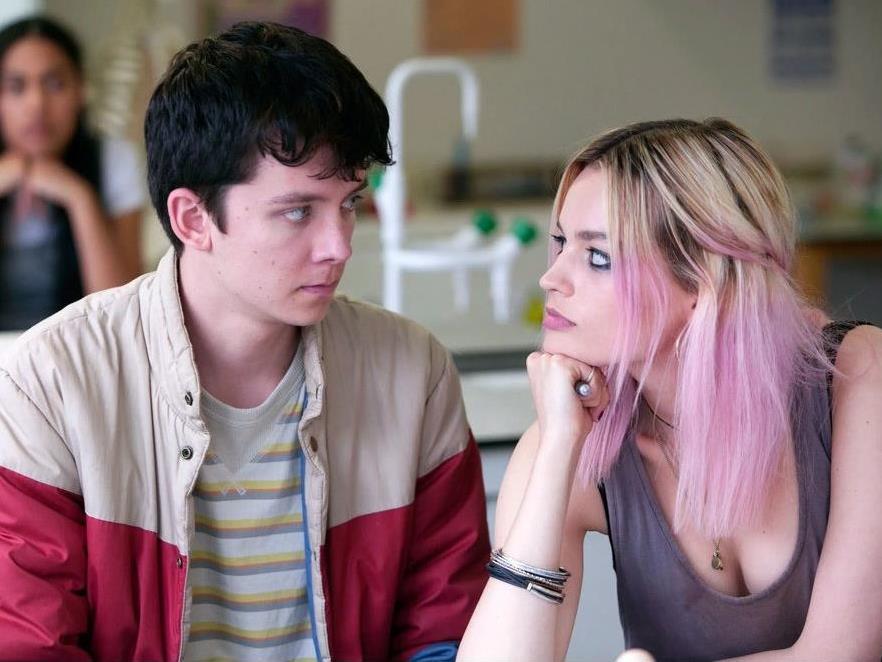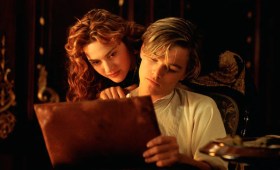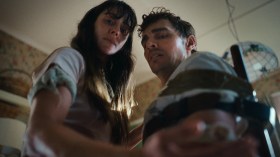Image: Asa Butterfield and Emma Mackey in Sex Education. Source: Netflix.
The lively UK TV series Sex Education, currently streaming on Netflix, features a running gag that jolts us each time it appears. Every morning at school, central characters Otis (Asa Butterfield), Eric (Ncuti Gatwa) or Maeve (Emma Mackey) retrieve something from their lockers, which are situated in a long corridor, at head level. The camera is always in the same position, framing the actor, at their left, in profile. This composition allows for a surprise “reveal”: when the locker door is closed, there’s usually someone else suddenly standing there, ready to either ask nosy questions or apply some menacing peer pressure.
This will be a familiar gag to some viewers – nostalgically so if, like me, you “came of age” while watching the great American teen movies of the 1970s and ‘80s, from George Lucas’ American Graffiti (1973) to John Hughes’ Ferris Bueller’s Day Off (1986), with literally thousands of imitations and off-shoots made all over the world, such as the Israeli-West German Lemon Popsicle series (1978-2001). Australia, of course, also tried its hand at the genre, in everything from John Duigan’s sombre social issue piece Mouth to Mouth (1978) to Michael Pattinson’s Beatlemania comedy Secrets (1992) starring Danni Minogue and Noah Taylor.
In Sex Education, the very size of the school creates a hazy confusion: what country are we in, exactly? And – given the presence of so much rousing 1980s pop on the soundtrack – what decade is being depicted? We are far from the precise realism of the celebrated UK series Skins (2007-2013) here. Previously in Screenhub, Rochelle Siemienowicz has appreciatively pointed to the curious mix of very “contemporary” subject matter in Sex Education – every kind of sexual function and dysfunction is canvassed, with a charmingly light touch – and a tone that is “reminiscent of more innocent US 1980s teen dramas”.
For better and for worse, Sex Education spins a particular sort of fantasy – the vision of a perfect (or at least better) world conjured from fragments of a “collective imagination” fed by several generations of teen-related movies and TV series. Scouring social media, we find the complaint from UK media scholar Melanie Selfe that Sex Education is “all very strange and non-realist”, forming a nebulous “Britishness” by “collapsing different urban and rural English experiences into a Welsh landscape”.
On the positive side, well-known American cinephile Girish Shambu has praised the show’s “complete commitment to normalisation: of topics, issues, identities usually thought of as marginal or counter-normative or progressive. For example: sex-positivity is simply a given, homophobia is ridiculous, traditional gender roles are dumb, heteronormativity is passé, racial/ethnic difference is everywhere but seldom remarked-upon, and the depiction of sex is impressively diverse but totally matter of fact”.
Impressively diverse, indeed. Sex Education has scored a goal where last year’s ambitious US drama series Here and Now (cancelled after one season, with a complicated plot left frustratingly up in the air), starring Holly Hunter and Tim Robbins, apparently fumbled. Using high-key comedy, Sex Education’s chief creator, Laurie Nunn, manages to represent a generous spread of characters emblematic of various gender, class, race, religion and social status positions – and then proceeds to manoeuvre them into surprising, transformative encounters. The series is impressive also for the way it balances plot lines particular to each episode with the long story arcs crossing all eight episodes so far (a second series is rumoured to be in the works).
Above all, Sex Education marks the surprising and endearing return of teen fiction into mainstream entertainment. The sorts of small, B-budget teen flicks that proliferated everywhere in the 1980s and beyond – once a staple genre on the shelves of VHS and DVD shops of yore – seemed to sadly vanish overnight during the movie blockbuster milieu of the 21st century. Triggered by the success of Greta Gerwig’s Lady Bird (2017), we are now witnessing a new flood of both independent films and TV series addressing teenage experience in all its muckiness and complexity.
Some of these recent teen movies – such as Skate Kitchen, Dude, Eighth Grade and Every Day – owe much to the “Young Adult” genre of literary fiction, where an entire plot can be woven from the secret that one kid keeps from her best friend, or a single “magic realist” detail (such as reincarnation) alters the typical youthful romance scenario. The genre is “spreading out” once more in all senses – exploring the extreme poles of everydayness and euphoria that are deftly combined in Sex Education.
Laurie Nunn’s career trajectory is intriguing. At least according to IMDb, her experience prior to Sex Education was as writer or director on three short films. It’s a big leap from that to almost seven tightly controlled hours of TV comedy. Less surprising, at this point, is Nunn’s announced move into the feature film arena as the writer of the ensemble drama The Summer House, adapted from Hannah McKinnon’s 2017 novel. As George Lucas can certainly testify, a successful teen narrative can take you a long way.
4 STARS out of 5
© Adrian Martin January 2019
Actors:
Director:
Format:
Country:
Release:





